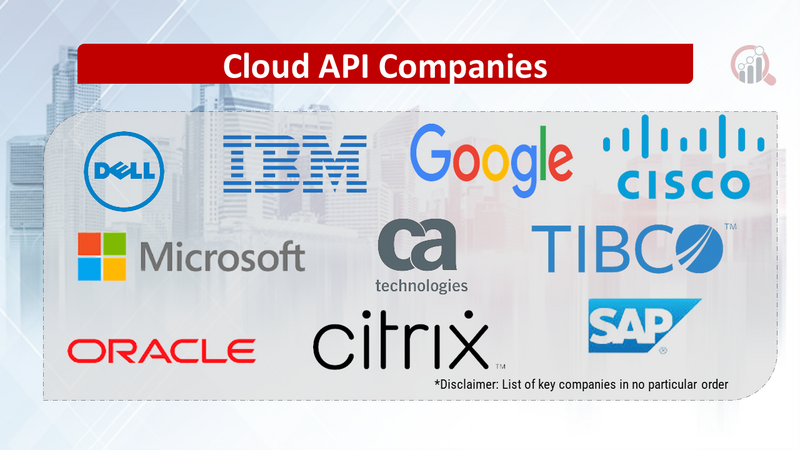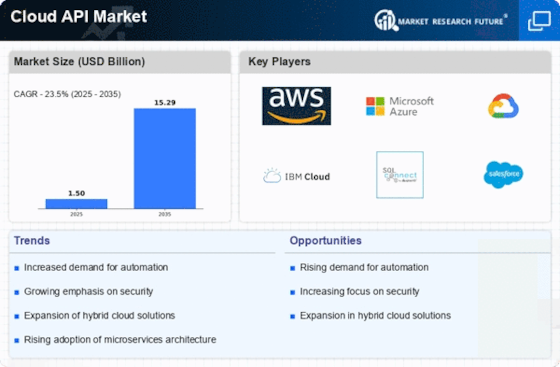Top Industry Leaders in the Cloud API Market

Cloud API Market: Dive into the Latest News and Updates
The cloud has become the digital canvas for modern businesses, and APIs are the vibrant paints, enabling applications to interact and data to flow freely.
Some of Cloud API Companies Listed Below:
-
Amazon
-
Google
-
International Business Machines Corporation
-
Oracle
-
RedHat
-
SAP-HANA
-
CA Technologies Inc.
-
Microsoft Corporation
-
TIBCO Software Inc.
-
Citrix Systems
-
Rackspace Inc.
-
Zend Technologies Ltd. Inc.
-
VMWare
-
Dell
-
CA
-
IBM Corporations
-
Salesforce
-
SAP SE
-
Others
Strategies Fueling Growth:
-
Security and Compliance: Robust security features like authentication, authorization, and encryption build trust and open doors to data-sensitive industries and regulated environments. -
Developer Experience and Ease of Use: Providing intuitive developer tools, API documentation, and sandbox environments attracts developers and accelerates API adoption. -
Openness and Interoperability: Supporting open standards and integrating with diverse platforms and tools fosters a broader ecosystem and simplifies API integrations. -
Data Insights and Analytics: Offering analytics tools to track API usage, performance, and user behavior enables data-driven optimization and better API management.
Market Share Decoding: Key Factors to Consider:
-
Functionality and Feature Set: Platforms offering a comprehensive range of features for API design, deployment, security, and analytics cater to diverse development needs and complexities. -
Scalability and Performance: Ability to handle large volumes of API calls and ensure reliable performance under high traffic is crucial for enterprise-grade deployments. -
Pricing and Cost-Effectiveness: Competitive pricing models, pay-as-you-go options, and open-source solutions make cloud APIs accessible to businesses of all sizes and budgets. -
Integration Capabilities: Seamless integration with existing cloud platforms, development tools, and on-premises systems simplifies API deployments and accelerates adoption.
New and Emerging Stars: Illuminating the Cloud API Path
-
Serverless API Function Management: Startups like Fauna and Vercel offer serverless platforms for building and deploying APIs, simplifying backend development and reducing infrastructure management overhead. -
API Monetization and Marketplace Solutions: Companies like RapidAPI and Moesif develop platforms for selling, distributing, and managing APIs, creating new revenue streams for developers and enabling wider API discovery. -
AI-Powered API Design and Optimization: Startups like Pachyderm and Akami explore AI-powered tools for recommending API design patterns, optimizing performance, and identifying security vulnerabilities.
Investment Trends: Where the Cloud API Dollars Flow:
-
Open-Source API Management Platforms: Investors are backing open-source platforms like Kong and Tyk, catering to businesses seeking flexible and customizable solutions at a lower cost. -
Serverless API Function Platforms: The growing popularity of serverless architectures encourages investments in companies like Fauna and Vercel, simplifying API development and deployment. -
AI and Machine Learning Integration: Investments are pouring into companies developing AI-powered tools for API design, security, and performance optimization, promising significant efficiency gains and automation.
Latest Company Updates:
October 20, 2023:
-
Google Cloud announces launch of Vertex AI API Marketplace: This platform simplifies access to pre-trained AI models and allows developers to easily integrate AI capabilities into their applications. -
Amazon Web Services (AWS) expands API Gateway offering: New features include developer-friendly tools for API documentation, testing, and deployment, streamlining the API development process.
November 12, 2023:
-
Focus on serverless APIs: Serverless APIs allow developers to build and deploy applications without managing infrastructure, increasing agility and reducing costs.
December 5, 2023:
-
Microsoft Azure expands its API ecosystem: New partnerships with leading technology companies enable developers to access a wider range of APIs for various functionalities. -
Open-source APIs gain traction: Developers are increasingly turning to open-source APIs for faster development and increased transparency.
January 8, 2024:
-
Security and compliance become top priorities: Cloud API providers are offering enhanced security features and compliance certifications to address growing concerns about data privacy and security. -
Rise of API management platforms: These platforms provide centralized control and visibility over APIs, simplifying governance and ensuring smooth operations.










